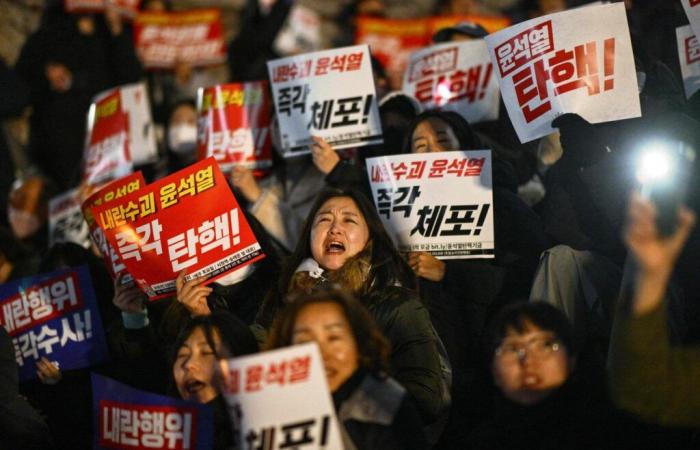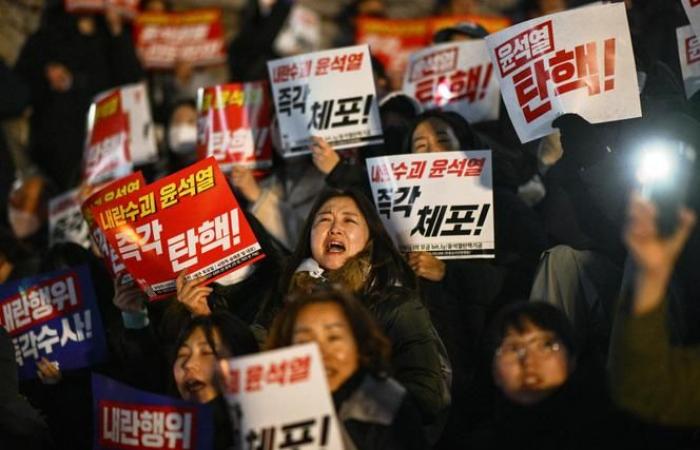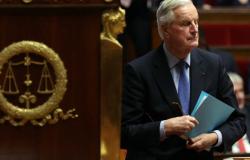South Koreans took to the streets on Wednesday, December 4, angry at one man: President Yoon Suk Yeol, whose abortive coup to try to impose martial law in the country shocked the citizens of this young democracy. The streets of the capital Seoul were taken over by thousands of demonstrators and police, while unions called for a general strike, and the opposition demanded the resignation of the president, accusing him of rebellion.
With banners calling for the impeachment of the president, candles and distribution of hot drinks, Koreans marched towards the presidential palace, showing their deep shock, as the opposition tabled an impeachment motion in Parliament against the country's former attorney general.
This motion, which will require a two-thirds majority to be adopted, could be put to a vote on Friday, said the six opposition parties represented in Parliament, including the main one, the Democratic Party (center left ).
Read also | Article reserved for our subscribers In South Korea, the president's attempted coup failed
Read later
Mr. Yoon, whose popularity rating was already at an all-time low, has his back against the wall by both the opposition and his own party after introducing martial law during a surprise speech late Tuesday, before repealing the measure a few hours later under pressure from deputies and the street.
In the context of the difficult adoption of the 2025 budget, the president justified this coup by saying he wanted “eliminate elements hostile to the State” et “protect liberal South Korea from threats posed by North Korean communist forces”.
Mr. Yoon, narrowly elected in 2022 and who has never had a majority in Parliament, had pointed out a “legislative dictatorship” and accused the elected representatives of the opposition of blocking “all budgets essential to the primary functions of the nation”.
Turning our back on nearly forty years of democracy
After Yoon's announcement, troops were deployed and army helicopters landed on the roof of the Korean Parliament, but lawmakers were able to convene in a hurry to pass a resolution demanding the measure be repealed. . In total, more than 280 soldiers broke into Parliament, according to the Yonhap news agency. A total of 190 deputies out of 300 still managed to gather in the hemicycle, where special forces soldiers were trying to penetrate. They managed to unanimously vote on a motion calling for the lifting of martial law.
The Memorable World
Test your general knowledge with the editorial staff of “Le Monde”
Test your general knowledge with the editorial staff of “Le Monde”
Discover
The imposition of martial law involved the suspension of political life, the closure of Parliament and the placing under control of the media.
At the start of Wednesday evening, the head of state had still not reappeared in public and some of the demonstrators said they were shocked to have seen their country so close to turning its back on nearly forty years of democracy.
“Unlimited general strike” until Mr. Yoon resigns
Opposition leader Lee Jae-myung, who narrowly lost the presidential election to Mr. Yoon, called the move a“illegal”. “We are going to file a complaint for rebellion” against the president, his ministers of defense and interior and “key figures in the military and police, such as the martial law commander and the police chief”announced the Democratic Party on Wednesday.
Defense Minister Kim Yong-hyun announced that he had offered his resignation to the president. “I deeply regret and take full responsibility for the confusion and concern caused to the public by martial law”he wrote in a press release. Even Mr. Yoon's party, the People's Power Party, distanced itself from the president's initiative.
The Korean Confederation of Trade Unions, the largest inter-union organization in the country with some 1.2 million members, called for a “unlimited general strike” until Mr. Yoon resigned, believing that he had “signed his own end to power”.
The lifting of martial law in South Korea shows « l’engagement » of the country towards the rule of law, NATO Secretary General Mark Rutte said on Tuesday. “I believe the announcement of the end of martial law indicates South Korea's continued commitment to the rule of law”he declared during a press conference in Brussels. President Yoon Suk Yeol introduced martial law late Tuesday, before repealing this measure barely six hours later under pressure from MPs and the streets.
Read also | Article reserved for our subscribers In South Korea, democracy threatened by the populist excesses of Yoon Suk Yeol
Read later







